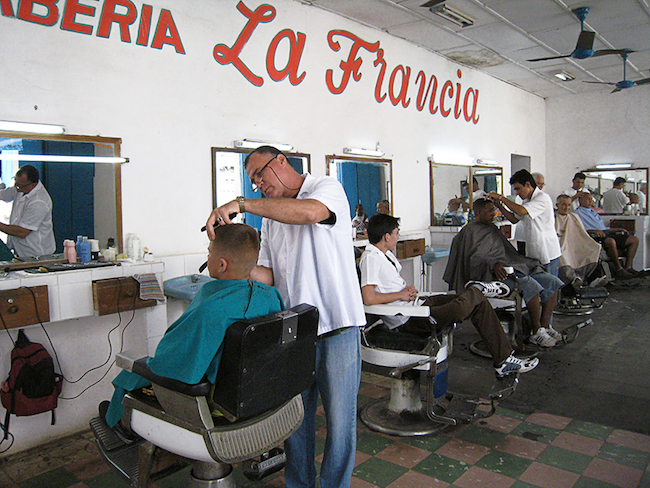
Students in Miami University’s Farmer School of Business visited a Cuban barbershop and other small businesses last year to learn about the island’s entrepreneurs
STILL MANY LOGISTICAL HURDLES IN VISITING THE ISLAND
The Farmer School’s trip to Cuba last year was filled to capacity, with a waiting list, and a similar number of students plan to go this year, Salzarulo says. At the Carlson School, 28 students went on the trip last year. “I’ve never seen a more excited group of students,” says Steve Spruth, senior lecturer in the school’s strategic management and entrepreneurship department. “They could barely sit in their seats the first day of class, which is rare,” he said. “That tells me that we’ve created this experience that people realize is hard for them to have on their own. You want to say you were in Cuba before it changed.”
One of the challenges business schools visiting Cuba frequently confront is making the trip meaningful enough for students from both a cultural and business perspective. For example, it can be hard to book student tours with Cuban companies because most are not open to having students from universities outside of Cuba visit them, says the Farmer School’s Salzarulo. As a result, he says, the school has had to get creative about setting up site visits that resonate with business students.
Joseph Reibel, a senior majoring in supply chain management at the Farmer School, was on last year’s trip and says he most enjoyed paying visits to small entrepreneurs, such as one stop the group made at a barbershop in Havana.
“They were one of the first businesses to get away from the Cuban government, do their own thing and be private,” Rebel says of the barbershop. “It was cool to see how they’ve grown in the last three years and how they’re trying to grow their business into a larger corporation.”
‘GREAT FOR STUDENTS TO SEE SOMETHING THAT WE TAKE FOR GRANTED’
During this year’s trip to Cuba, which will take place in January, Farmer students will get a chance to visit with the owners of a co-op restaurant, a farm, and a recording studio, Salzarulo says, all of which will be eye-opening for students in different ways.
“They have a different example of business sense than we do in the U.S., and there’s not much of a sense of the importance of efficiency,” Salzarulo says. “That’s a hangover from communism, and it is great for students to see something that we take for granted.”
The Carlson School will take its second trip to Cuba this spring as part of Spruth’s semester-long management course called Introduction to Global Entrepreneurship. He says the trip will be a way to encourage entrepreneurial thinking in students, who will be tasked with studying an entrepreneur in Cuba who has developed a successful business that has taken off on the island. The students will then develop a pitch for that entrepreneur that could help them grow or expand their business further in Cuba, and they’ll present their idea to the business once they arrive in Cuba.
He cites the example of students who last year pitched an idea to a company that runs a taxi fleet of vintage restored American cars, encouraging them to create an online ordering service where tourists could order online the cars from their hotels, one of the few places in Cuba where wifi is readily available. Another group from Carlson came up with an idea for a “pedal pub” vehicle that Havana Club International, a joint venture between Cuba’s government and the French distilled beverage company Pernod, could use to help promote its products. This could be a semi-legal form of advertising, Spruth says, as billboard advertising is not legal currently in Cuba.
Executives at the companies warmly received the students’ ideas, and discussions between them and students continued well after they’d left the island, Spruth said. Students also got a chance to fine-tune their pitches in class once they returned to the U.S., adjusting them based on what they’d learn about the Cuban economy and companies’ specific needs.
‘PRICELESS’ CULTURAL AND BUSINESS INSIGHTS
For the next trip, Spruth is planning to add another layer to the trip’s entrepreneurship focus by having Carlson students interact with business students from the University of Havana who participate in that school’s business incubator. Both groups will get a chance to do a reciprocal pitch session, share information on business ideas, and gain insight into each other’s cultures.
“The students will get insight that can only come from someone with a different background,” Spruth says. “That will be priceless. They’ll also get to see what it means to be a business student in Cuba today and what the aspirations are like for those students.”
SEE ALSO B-SCHOOLS EXPLORE BUSINESS IN CUBA











Questions about this article? Email us or leave a comment below.